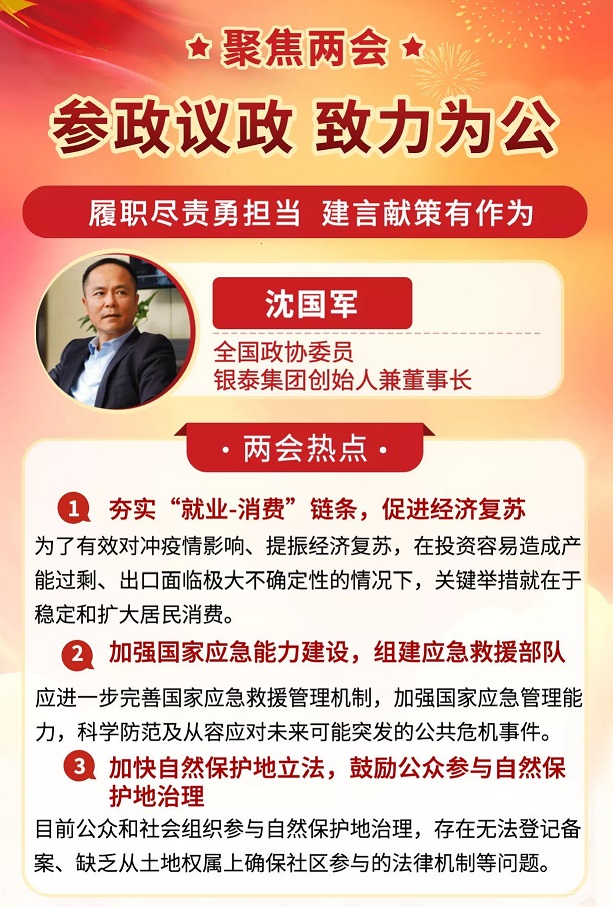YINTAI
EN | 中文
- ABOUT US
- OUR BUSINESS
- SOCIAL RESPONSIBILITY
- NEWS CENTER
- JOIN US
- En|中文

Editor’s note: Zhigong Party recently released an article entitled, Committee member Shen Guojun: Enterprises that took the initiative not to lay off staff should be granted fiscal subsidies, or tax reduction or exemption. The following is the full text of the news roundup.
During this year’s NPC and CPPCC, Shen Guojun, member of the CPPCC National Committee, member of the Standing Committee of 15th Central Committee of China Zhigong Party, Executive Chairman of the General Association of Zhejiang Entrepreneurs, President of the General Association of Ningbo Entrepreneurs, Founder and Chairman of Yintai Group, and Executive Chairman of The Paradise International Foundation made proposals on various topics such as the weaknesses related to the prevention and control of COVID-19, accelerating post-COVID-19 economic recovery, and accelerating nature reserve legislation from three separate perspectives, namely business, public safety management and environmental protection.
Consolidate the “employment-consumption” chain to promote economic recovery
In the Proposal for Providing Further Support for Private Enterprise Development, Consolidating the “Employment-Consumption” Chain, and Promoting Economic Recovery, Shen said that, to effectively offset the impact of COVID-19 and to boost economic recovery given overcapacity that could easily result from investment and significant export uncertainty, the key measure lies in stabilizing and expanding domestic consumption. The most substantive factor in driving consumption is to stabilize employment. Only this can lead to a virtuous effect of stable enterprises driving stable employment which in turn drives consumption, which then drives economic recovery.
In this regard, Shen believed that further support for private enterprise development should be provided. In addition, efforts to help SMEs such as tax reduction or exemption and providing financial support should be enhanced. Elsewhere, the government should extend the implementation period of relevant supporting measures, improve the business environment, and create strategic opportunities for SMEs as they rehabilitate. Meanwhile, cross-industry and inter-departmental collaboration should be strengthened. Enterprises that have taken the initiative not to lay off staff or eliminate duties should be granted fiscal subsidies, or tax reduction or exemption, and be encouraged to develop across multiple related industries, create employment opportunities, promote consumer demand, and bring into play the factors that will facilitate growth of the industry chain.
Enhance National Emergency Response Capabilities and Establishing an Emergency Rescue Unit in Due Course
In the Proposal for Enhancing National Emergency Response Capabilities and Establishing an Emergency Rescue Unit in Due Course, Shen said that the impact of the sudden outbreak of COVID-19 was unprecedented. Issues such as “failure to warn” and “concealment and omission in reporting” were severe at the start of the pandemic, and hindered and delayed the prevention and control of the spread of COVID-19. During the period of COVID-19 prevention and control, issues such as the lack of emergency supervision, poor information channels, inaccurate information statistics, slow emergency response, inadequate emergency readiness, and weak professional rescue strength, appeared, to varying degrees, in many regions across the country.
Shen believed that the national emergency rescue management system should be further improved in areas such as strengthening the institutionalization of the emergency rescue system, establishing an emergency rescue unit in due course, expanding the sources of the emergency rescue fund, actively carrying out international emergency rescue exchange and cooperation, and enhancing emergency rescue public education and communication, so that the national emergency management capabilities could be enhanced, and future outbreaks of public crises and incidents scientifically prevented and addressed confidently.
With “further strengthen the institutionalization of the emergency rescue system” as an example, Shen recommended the establishment of a centrally led, authoritative and efficient national emergency capabilities system with consistent responsibilities, enhancing the system of emergency management laws and regulations, improving the emergency command and coordination mechanism, and upgrading the emergency command capability of Party leaders and cadres at all levels. At the same time, the leadership system and mechanism of the Party in respect of emergency management should be comprehensively strengthened, the characteristics and advantages of the nation’s emergency management system brought into play, and the modernization of the emergency management system and capabilities actively promoted. These will lead to the establishment of an emergency management and service assurance system with Chinese characteristics that is government-led and locally managed with community collaboration and multi-party support.
Accelerate nature reserve legislation and encourage public participation in nature reserve governance
In the Proposal for Accelerating Nature Reserve Legislation and Encouraging Public Participation in Nature Reserve Governance, Shen said that at this time, issues such as the inability to register and file on record, as well as the lack of legal mechanisms related to land ownership to ensure community participation impeded participation in nature reserve governance by the public and social organizations.
In this regard, Shen recommended that the record filing and registration system for nature reserves should be defined and public easement crystallized in the nature reserve legislation. An administrative contract should be adopted to encourage to grant nature reserve management mandates to social organizations or communities. The franchise system should be defined, and preferential support should be given to local communities and enterprises as franchise principals. The public should be encouraged to take part in nature reserve management as volunteers. A volunteer service system and a uniform nature reserve volunteer service information platform should also be set up to broadcast nature reserve volunteer service requirements so that a shared, public and transparent management system for volunteers could be established.